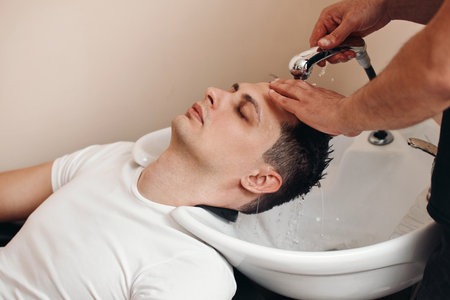1. The Myth of Cleaner is Better
In American culture, theres a strong belief that being extra clean is always better—especially when it comes to our skin. From antibacterial soaps to deep-cleansing face washes, many people assume that the more you scrub, the healthier your skin will be. But when it comes to healing, especially after procedures like chemical peels, microneedling, or laser treatments, over-cleansing can actually do more harm than good.
Why We Think More Cleansing Helps
Its easy to fall into the trap of thinking that removing every trace of oil and dirt will speed up recovery and prevent breakouts or infections. After all, were constantly told that germs are bad and cleanliness prevents problems. However, your skin needs a delicate balance of natural oils and beneficial bacteria to protect itself and heal properly.
How Over-Cleansing Affects Healing
When you cleanse too often or use harsh products during the healing process, you may strip away the very elements your skin needs to repair itself. This includes:
- Natural oils – These help keep the skin barrier intact and lock in moisture.
- Healthy bacteria – Your skin microbiome plays a key role in preventing infections.
- Protective barrier – Frequent washing can disrupt the outer layer of skin thats trying to regenerate.
Common Signs You Might Be Over-Cleansing
| Symptom | What It Could Mean |
|---|---|
| Tight or dry feeling after washing | Your skin barrier may be compromised |
| Redness or irritation | You could be removing protective layers needed for healing |
| Flaky or peeling patches | Skin is struggling to retain moisture due to over-cleansing |
Remember:
Your skin doesn’t need to feel squeaky clean to be healthy. In fact, that tight feeling might be a warning sign that you’ve gone too far. When healing from any treatment or injury, gentle care is often more effective than aggressive cleansing.
2. How Over-Cleansing Disrupts Your Skin Barrier
When it comes to skincare, more isnt always better. Washing your face or body too often—especially with harsh cleansers—can actually do more harm than good. Your skin has a natural barrier made up of oils, proteins, and cells that work together to protect against bacteria, pollutants, and moisture loss. This protective layer is essential for healing and maintaining healthy skin.
Understanding the Skin’s Natural Barrier
The outermost layer of your skin, known as the stratum corneum, acts like a shield. It holds in moisture and keeps out harmful substances. It also contains natural oils (sebum) that keep the skin soft and balanced. When you cleanse too frequently or use products with strong detergents or alcohols, you strip away these essential oils.
Effects of Over-Cleansing on the Skin Barrier
| Issue | What Happens | Why It Matters |
|---|---|---|
| Loss of Natural Oils | Skin becomes dry and tight | Lack of moisture slows down healing and increases sensitivity |
| Irritation | Redness, stinging, or flaking may occur | A compromised barrier can’t protect against irritants |
| Increased Breakouts | Over-cleansing can trigger more oil production | This imbalance can clog pores and lead to acne flare-ups |
| Delayed Healing | Cuts or wounds take longer to repair | The skin lacks the resources it needs to regenerate properly |
How Often Should You Cleanse?
For most people, cleansing twice a day—once in the morning and once at night—is enough. If you have very dry or sensitive skin, you might only need to wash once daily with lukewarm water and a gentle cleanser. After treatments like microneedling, laser procedures, or chemical peels, your provider may recommend even less frequent washing to allow your skin to recover naturally.
Tip:
Always choose a fragrance-free, pH-balanced cleanser designed for sensitive skin during recovery periods.

3. The Role of Good Bacteria in Skin Healing
When we think about hygiene, we often assume that cleaner is always better. But when it comes to your skin, theres a delicate balance at play. Your skin isnt just a protective barrier—its also home to a thriving community of microorganisms known as the skin microbiome. These tiny organisms, including bacteria, fungi, and viruses, actually play a major role in keeping your skin healthy and helping it heal.
Why the Skin Microbiome Matters
The skin microbiome acts like a natural defense system. It helps protect against harmful bacteria, supports the immune response, and even aids in repairing damaged skin. When you over-cleanse or use harsh products, you strip away not only dirt and oil—but also these helpful microbes. This disruption can slow down the healing process and leave your skin more vulnerable to irritation, infection, and inflammation.
Common Ways Over-Cleansing Disrupts the Microbiome
| Action | Effect on Skin Microbiome |
|---|---|
| Using harsh cleansers | Kills both harmful and beneficial bacteria |
| Cleansing multiple times a day | Disrupts natural oil balance and microbial diversity |
| Using antibacterial soaps regularly | Wipes out protective bacteria needed for healing |
How Beneficial Bacteria Help Heal Your Skin
Good bacteria on your skin help by producing substances that fight off harmful microbes, reducing inflammation, and promoting tissue regeneration. They also communicate with your immune system to keep it balanced—neither too aggressive nor too weak. This is especially important during wound healing when your skin is already compromised.
Simple Tips to Protect Your Skin Microbiome
- Use gentle, pH-balanced cleansers instead of harsh soaps.
- Avoid over-washing; once or twice daily is usually enough.
- Look for skincare products labeled “microbiome-friendly.”
- Consider using moisturizers with prebiotics or probiotics.
Your skins good bacteria are essential teammates in the healing process. By being mindful of how often and what you cleanse with, youre not just keeping your skin clean—you’re also supporting its natural ability to repair and protect itself.
4. Signs You Might Be Over-Cleansing
While keeping your skin clean is important, there is such a thing as too much cleansing—especially when youre in the healing process after a cosmetic procedure or dealing with sensitive skin. Over-cleansing can strip away your skin’s natural oils and disturb its protective barrier, making it harder for your skin to recover properly. Here are some common signs that you might be overdoing it:
Common Symptoms of Over-Cleansing
If youve noticed any of the following issues, your skincare routine might be too aggressive:
| Symptom | What It Means |
|---|---|
| Excessive Dryness | Your skin feels tight, rough, or flaky—this could mean youre removing too much natural oil. |
| Redness | This can be a sign of irritation caused by over-washing or using harsh cleansers. |
| Peeling or Flaking | If your skin starts peeling without using exfoliating products, over-cleansing could be the culprit. |
| Sensitivity or Stinging | A burning or stinging sensation after washing may indicate your skin barrier is compromised. |
Why These Symptoms Matter During Healing
When your skin is trying to heal—whether from acne treatments, chemical peels, laser therapy, or other procedures—it needs a balanced environment to repair itself. Over-cleansing disrupts this balance and can slow down recovery. It may even lead to secondary problems like breakouts, inflammation, or infections due to a weakened skin barrier.
Quick Self-Check Questions
- Do you cleanse more than twice a day?
- Are you using strong soaps or exfoliants daily?
- Does your skin feel tight or sting after washing?
If you answered “yes” to any of these questions, it might be time to scale back and let your skin breathe. A gentler approach often leads to better long-term results, especially during the healing phase.
5. Healthy Cleaning Habits for Optimal Healing
When your skin is healing—whether from a cosmetic procedure, acne treatment, or even daily irritation—finding the right balance in your hygiene routine is key. Over-cleansing can strip away natural oils, disrupt your skin’s microbiome, and delay recovery. Here are expert-backed tips to help you stay clean without compromising your skins ability to heal.
How Often Should You Cleanse?
The general rule of thumb is to cleanse your face twice a day: once in the morning and once before bed. However, during the healing process, less may be more. Heres a simple guide:
| Skin Condition | Cleansing Frequency |
|---|---|
| Post-treatment (e.g., after laser or chemical peel) | 1x daily or as directed by your provider |
| Sensitive or irritated skin | 1x daily with lukewarm water only |
| Oily or acne-prone skin (not undergoing treatment) | 2x daily with gentle cleanser |
Selecting the Right Products
Your choice of cleanser plays a major role in how well your skin heals. Avoid harsh scrubs, alcohol-based toners, and strong acids when your skin barrier is compromised. Instead, look for these product features:
- Mild and Fragrance-Free: Fragrances can irritate healing skin.
- Sulfate-Free: Sulfates can over-dry and damage the protective barrier.
- Packed with Soothing Ingredients: Look for aloe vera, chamomile, or oat extract.
- pH-Balanced: Helps maintain a healthy skin barrier.
Recommended Product Types
| Cleansing Type | Description | Best For |
|---|---|---|
| Cream Cleansers | Nourishing and non-foaming; often contains moisturizing agents. | Sensitive or dry healing skin |
| Micellar Water | No-rinse option that gently lifts dirt and oil. | Mild cleansing for post-treatment care |
| Gel Cleansers (Gentle) | Mild foaming; designed for oily or combination skin. | If no irritation present and oil control needed |
The Importance of Gentle Application
A big part of healthy cleansing isn’t just what you use—it’s how you use it. Be kind to your skin by following these steps:
- No hot water: Use lukewarm water to avoid stripping natural oils.
- No scrubbing: Gently massage cleanser using fingertips in circular motions.
- No rough towels: Pat dry with a soft cloth instead of rubbing.
A Quick Routine Checklist
- Cleansing frequency adjusted based on skin condition ✔️
- Mild, fragrance-free products ✔️
- Lukewarm water only ✔️
- No physical exfoliants during healing ✔️
- Patted dry with soft towel ✔️
Your skin does a great job of repairing itself when given the right environment. By adopting gentle and mindful cleansing habits, you support its natural healing process rather than disrupting it.


